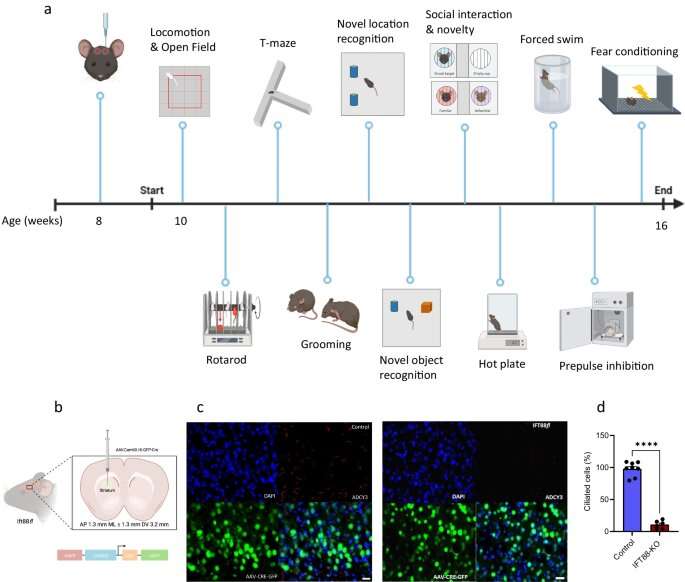

Researchers at the University of California, Irvine have discovered that removal of cilia from the brain’s striatum region impaired time perception and judgment, revealing possible new therapeutic targets for mental and neurological conditions including schizophrenia, Parkinson’s and Huntington’s diseases, autism spectrum disorder, and Tourette syndrome.
The striatum processes and integrates new environmental sensory information and coordinates the time sequence of motor responses. A common feature across specific mental and neurological disorders is a profound decline in patients’ ability to adjust to variations in their surroundings and accurately estimate the timing and termination of voluntary actions.
The study, recently published online in the journal Molecular Neurobiology, uncovered the first evidence of the important role cilia play in timing-dependent dysfunction.
“Our findings may revolutionize our understanding of brain functions and mental disorders in the context of the critical task performed by these previously unappreciated organelles in the brain’s ‘central clock’ function,” said Amal Alachkar, Ph.D., corresponding author and professor of teaching in UCI’s Department of Pharmaceutical Sciences. “Our results may open new avenues for effective intervention through cilia-targeted therapies for treatment.”
The striatum is part of the brain’s circuitry that performs central clock processes, essential in controlling executive functions such as motor coordination, learning, planning and decision-making, as well as working memory and attention. Cilia protrude from the brain cell surfaces like antennae, working as a signaling hub that senses and transmits signals to generate appropriate reactions.
To examine their physiological role, the researchers removed cilia from the striatum in mice using conditional gene manipulation technology. These rodents were not able to learn new motor tasks, showed repetitive motor behavior and exhibited delays in decision-making. They were also deficient in rapidly recalling information about their location and orientation in space and in their ability to filter irrelevant environmental sensory information. However, the mice maintained habitual or already learned motor skills and long-term memories.
“Successful performance of working memory, attention, decision-making and executive function requires accurate and precise timing judgment, usually within a millisecond to a minute,” Alachkar said. “When that capacity is impaired, it means losing the ability to quickly adjust behavior in response to changes in external stimuli and failing to sustain appropriate, goal-oriented motor responses. Our ongoing work is aimed at understanding the mechanisms by which cilia regulate time perception and developing targeted therapies to improve behavioral deficits.”
Source: Read Full Article